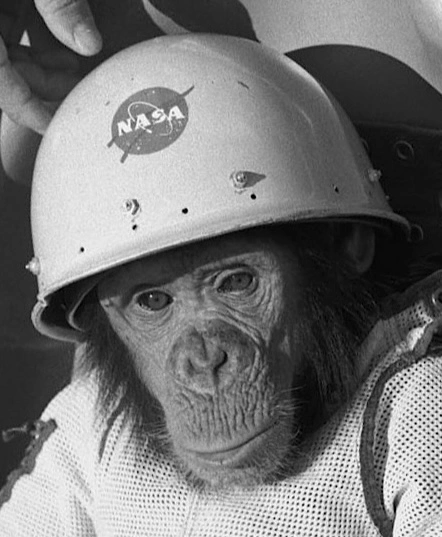I’m partial to “The question I get asked by religious people all the time is, without God, what’s to stop me from raping all I want? And my answer is: I do rape all I want. And the amount I want is zero. And I do murder all I want, and the amount I want is zero. The fact that these people think that if they didn’t have this person watching over them that they would go on killing, raping rampages is the most self-damning thing I can imagine”
deleted by creator
Immunity to cognitive dissonance is a requirement to believe in religion.
As some day it may happen that a victim must be found
I’ve got a little list — I’ve got a little list
Of society offenders who might well be underground
And who never would be missed — who never would be missed!
– Gilbert and Sullivan, The MikadoThere’s absolutely a handful of figures – all well known, all active in politics or business, all gladly engaging in behaviors that cause mass harm and sometimes death – that I might be inclined to try to
murderassassinate. (Once you’re that famous, its assumed you have enemies who want to kill you, even if you’re just famous for being a Beatle and writing pop songs.)I’m not sure I could pull the trigger, having ever killed anyone, but I and many many others have motive good enough for the courts, regardless of who actually kills them.
But yeah, even if I had a really, really good rifle and training to use it (or a hit-man glad to do it for me) it would be an act of desperation. I would not fault a starving man for stealing food, and would applaud a mother swiping medicine for her kids.
My mores drive me, instead, to remove these people from their positions of power without causing them harm, or even better, to reform them ( by way of Inception maybe) so that they conduct themselves with empathy and awareness of all the harm they might cause by their actions. But when we don’t have the capacity to do that, and they continue to cause harm, the knife in the night whispers.
I would be worried by those people and distance myself from them asap tbh.
I do want to commit some crimes but I also have morals, crazy concept
Last year I jaywalked directly in front of a police. While waving. Oh the thrill.
I mean, my morals are so deeply embedded in me that I don’t even want to commit any crimes. Ever.
thats great for you, but imagine one day someone murders someone you really care about (may it never happen to you ever), you might want to kill that person, that is a perfectly normal feeling considering the circumstances but what stops you or not are your morals
Religious people have no empathy. Got it!
None for LBGT people that’s for sure
After Life. Good show.
Is this the same dude that did a whole episode of a tv show about how second hand smoke isn’t bad for you?
Almost, they did half an episode of Bullshit about second hand smoke.
On the topic, Bullshit was weird show, using Penn and Teller to make a show about disproving pseudo science and outright bullshit, and then also trying to disprove perfectly resonable stuff.
It did make me trust public restrooms more though, but I wasn’t a fan of their endangered species episode. Turns out they were right about recycling but that’s just kind of sad.
To be fair, they wanted to do a Bullshit Bullshit show to correct the record, but were told no.
climate denying shit bag.
Choose better.
According to his Wikipedia article he changed his view on climate change a decade ago.
In 2008, Jillette stated that there is not enough information to make an informed decision on global warming, that his gut told him it was not real, but his mind said that he cannot prove it.[46] As of 2014, he has changed his position and now believes that climate change is occurring
Both his past and present takes are perfectly reasonable. If you don’t know enough about something, then you don’t know. Simple as that. Much better than being confidently incorrect (or even confidently correct) about it when you don’t actually know the topic.
Makes me wonder how that even came up.
Who had the clever idea of asking: “Is climate change real? Let’s ask a magician/actor”.
I think it’s perfectly reasonable for people to have an opinion on various topics. They may be well informed or horribly misinformed.
The main issue is whether they can learn enough to either strengthen or weaken their view. And it sounds like Penn has.
Folks like you who readily attack those that admit they were wrong are part of the problem.
Fuck off
Wowowowowow
Looks like he changed his mind
He hasn’t held that view since 2014.
It’s actually happened with science in different ways. There have been several instances of concurrent discoveries, and some, like the Pythagorean Theorem, that has been repeatedly discovered (Pythagoras wasn’t the first to figure it out)
It’s a pretty smooth brain take because the core ideas of religion are just about universal. Those core ideas would be re-derived. It’s the details and names that vary. You could describe religion as a connectedness to, and humbleness before the mystery of, the universe
What I’m saying is that nobody knows how any of this works. Maybe we are in a simulation and there is a literal being overseeing us. Logical positivism & reductionist materialism have long been disproven by Godel’s Incompleteness Theorem & quantum uncertainty. We do not know what’s going on. Athiest people who claim they definitely know how the universe works are just as bad as fundamentalists. It’s the same mistake of overconfidence
Athiest people who claim they definitely know how the universe works
The thing is that atheists don’t do that. They are aware how science works and that what we consider to be true is only the current best approximation.
disproven by Godel’s Incompleteness Theorem
I don’t know much about most of the fancy words you’re throwing around. But I do know that the Incompleteness Theorem only states that statements can exist that you can neither prove nor deny. We could assume that a deity exists that chooses to hide its existence. This assumption would be such an independent axiom. If we take it to be true, however, then it is subject to reasoning, and we can quickly derive that this deity does not have the properties we usually associate with it. So while a deity may exist, it certainly isn’t the one we’re picturing, from which “God doesn‘t exist” follows necessarily.
It’s also worth noting that Gödel was talking about an axiomatization of mathematics, not the ‘real world.’
There is no god, that’s the simple truth
I think this is what the poster was referring to with the overconfidence part
“There are no unicorns, that’s the simple truth.”
Is this also over confidence?
There are a lot of children who believe in unicorns.
A lot of pictures too. The pictures are more consistent than that of the gods.
As I understand it, a statement like that is unscientific. You can say that the likelihood of unicorns existing is extremely small, trace possible mythological origins to show the stories are fabricated, but you can’t categorically prove that something doesn’t exist.
Are you saying that a proof that God doesn’t exist, can’t itself exist?
…Yes?
So therefore you can categorically prove that something doesn’t exist?
To be fair, one is about something that would be observable, and another is an abstract concept that as defined could be completely unobservable.
Of course, there no practical consequence of that hypothetical. Since we have no evidence we can’t claim to know the will of such a hypothetical being or beings. The problem with a hope or faith in such a hypothetical is really when a human asserts the authority of the divine to their own words, desires, and judgements. So if someone’s faith is truly private and they don’t believe they have any true insight into the nature of their faith, then no need to object since it’s it has zero effect in practice.
So the agnostic perspective rather than the atheist perspective.
We could assume that a deity exists that chooses to hide its existence.
The funny thing is it’s always been hiding at the edge of knowledge. Used to be sun and lightning, now it’s the architect of the supposed simulation we might be living in.
I think the point is that humanity 2.0 might believe the sea gods will reward your undying bloodlust and through many murders, you may be rewarded with eternal battle in the under halls.
But humanity 2.0 will always discover that the earth revolves around the sun the same way we did, and that whatever math they derive will provide the same answers as ours.
What core ideas are there in the big religions?
Besides the oppression of subserviente women and the hatred of homosexuals?
“a connectedness to, and humbleness before the mystery of, the universe”
This is the same rationale Stephen Colbert used when debating Ricky Gervais making the same point above. Yes, similar ideas may come back and people may invent new deities to direct this emotional response towards as humans have done in the past, but it is not observable and/or measurable fact. There is no evidence that any of these created deities are real, but the science of human behaviours in such a experiment may show that humans will always create religions to deal with the overwhelming response of appreciating the improbable notion that your conscious self exists.
the core ideas of religion are just about universal
Even just within Christianity, in the modern world, there are radical differences in the core ideas between sects. Across all religions, throughout history, the differences dwarf that.
It’s the details and names that vary
It’s not (see above), but if it were: the details count toward this as well. Just saying “meh, ignore the details” is cheating to get the answer you want.
You could describe religion as a connectedness to, and humbleness before the mystery of, the universe
How many religious people have you actually met, friend? I have known some whose views roughly fit that description, but most do not. In fact, I’d suggest that you could describe science that way. Religious people start with the belief, the box they want to put the universe in, and then insist that it must be, and attempt to adjust the facts to match their views - this is the farthest thing from humbleness before the mystery of the universe. Science tells us to put our preconceptions and expectations aside, and observe how the universe really functions - if we see facts that don’t match our current understanding, we adjust our understanding.
I think it’s funny that we attribute grand universals to things that are really just particular to our species because we’re simply meat machines lashed together to a similar loose specification.









